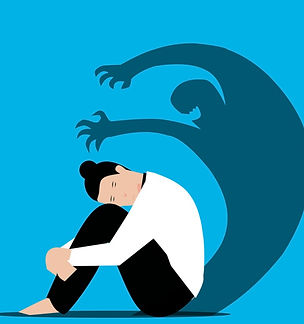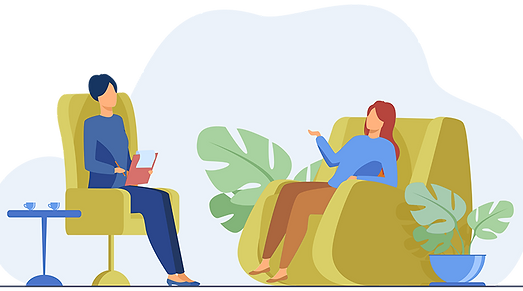
Therapy for Depression
in London, Ontario
Maybe you're here because you - or someone you love - is struggling with depression. Or maybe you've been assessed as having a depressive disorder. You might be feeling a bit overwhelmed or unsure what to do. Well, this page has lots of information about depression. But if time is tight, here's a great overview video

I'm Kathy Roberts, and for over 25 years, I've helped people with depression learn and apply skills to live a happier, more balanced life.
As suggested in the video, the best way to battle depression is by a combination of lifestyle changes, therapy and (often) medication. The therapy part is where I come in.
I encourage you to take some time to review the information below. But if you're already thinking that I might be the therapist you're looking for, then let's have a (no charge) 15 minute chat. You can call me at 519-281-8289 or complete this form.

What is Depression?
Depression is a mood disorder that causes a persistent feeling of sadness, irritable mood, emptiness and/or a loss of interest in things and activities you once enjoyed. It can also cause difficulty with memory, eating and sleeping. Depression can vary in intensity. It is normal to feel sad about or grieve over difficult life situations, such as losing your job or a divorce. But depression is different in that it lasts for a long period of time and involves other symptoms besides sadness. "Clinical depression" or "major depressive disorder" is diagnosed by a medical professional (such as a psychiatrist) and is the most severe kind of depression.
Depression is fairly common, but it is not very predictable. Over 15% of Canadians will experience depression at some point in their lives. For some, it only happens once. For others, there are multiple episodes. For some, the depression goes away on its own. For others, it gets worse unless treated.
Depression can affect how you feel, think and behave, and it can lead to a variety of emotional and physical problems. You might have trouble doing normal day-to-day activities, and you may sometimes feel as if life isn't worth living. In severe cases, it can lead to self-harm or death by suicide.
Depression is not a personal weakness. And you can't just "snap out of it." But here's the good news: Treatment for depression - lifestyle changes, medication and therapy - is usually very effective.
Warning Signs and Symptoms of Depression
Depression causes both physical and mental responses. It affects our bodies and our minds.
The symptoms of depression can vary somewhat depending on the type, and can range from mild to severe. Symptoms include:
-
Feeling very sad, teary, empty, hopeless or worried
-
Angry outbursts or frustration, even over small matters
-
Loss of interest or pleasure in most normal activities, such as sex, hobbies or sports
-
Being easily irritated or frustrated
-
Slowed thinking, speaking or body movements
-
Eating too much or too little, which may result in weight gain or weight loss.
-
Trouble sleeping or sleeping too much
-
Low energy or fatigue, so even small tasks take extra energy
-
Anxiety, agitation or restlessness
-
Feelings of worthlessness or guilt, fixating on past failures or self-blame
-
Having a hard time concentrating, making decisions or remembering things
-
Unexplained physical problems like headache, back pain, or stomach ache
-
Frequent or recurring thoughts of self-harm or suicide
For many people with depression, symptoms are severe enough to cause noticeable problems in day-to-day activities, such as work, school, social activities or relationships with others. Some people may feel generally miserable or unhappy without really knowing why.

Check out this video:
Causes of Depression

Although we don’t know the exact cause of depression, researchers think that several factors contribute to its development, including:
-
Brain chemistry: An imbalance of neurotransmitters, including serotonin and dopamine, contributes to the development of depression.
-
Genetics: If you have a first-degree relative (biological parent or sibling) with depression, you’re about three times as likely to develop the condition as the general population. However, you can have depression without a family history of it.
-
Stressful life events: Difficult experiences, such as the death of a loved one, trauma, divorce, isolation and lack of support, can trigger depression.
-
Medical conditions: Chronic pain and chronic conditions like diabetes can lead to depression.
-
Medication: Some medications can cause depression as a side effect.
-
Substance use: Including recreational drugs and alcohol, can cause depression or make it worse.
How to Support Someone with Depression
If someone you love is depressed, here's how you can express your concern and support:
-
Tell them you care about them, that they matter to you. Hold their hand.
-
Tell them you'll stand by their side, no matter how bad things get.
-
Tell them its not their fault. Its OK to feel this way. No judgment.
-
Offer practical help. Share the load. Check in regularly.
-
Encourage them to talk to both a medical doctor and a therapist.
-
Be an open-minded, attentive listener. Be empathetic.
-
Remind them they can get better. Don't let them give up on themselves.
Caregivers, Care for Yourselves
When someone you love is depressed, it can add extra stress and anxiety to your life, and it can be hard on your relationship. Here are some things you can do to take care of yourself.
-
Do research. Learn about depression, its symptoms and treatment options.
-
Be patient throughout the ups and downs. Stay positive.
-
Know your own limits. Make time for yourself, recharge your batteries.
-
Take care of your own physical and mental health.
-
Consider joining a support group.
-
Consider seeing a therapist on your own, or with your loved one.
Treating Depression
First things first ...
If you think you might hurt yourself or attempt suicide, call or text 988 to reach the Suicide Crisis Helpline, which is available 24 hours a day, seven days a week.
Secondly, if your depression is relatively severe, go to a medical doctor.
-
They will probably ask about your symptoms, medical history and mental health history.
-
They may order medical tests (such as blood tests) to see if any underlying medical conditions are causing your depressive symptoms.
-
They may diagnose you with a specific type of depression, such as seasonal affective disorder or postpartum depression, based on the context of your symptoms.
-
They may refer you to a psychiatrist or other mental health specialist.
-
They may prescribe anti-depressant medication such as an SSRI.
If you are reluctant to seek treatment, talk to a friend or loved one, any health care professional, a therapist, faith leader, or someone you trust.

Things you can do on your own ...
You can't always prevent depression, but there are things you can do to help reduce its symptoms, including:
-
Maintain a healthy sleep routine (not too little, not too much)
-
Get regular exercise, even if it is just a short walk
-
Eat a balanced diet
-
Manage stress with healthy coping mechanisms e.g. an enjoyable hobby, journaling
-
Practice self-care such as mindfulness, meditation or yoga
-
Avoid recreational drugs and alcohol (which is a depressant)
- Spend time with people you care about
Get professional help

With proper treatment, most people with depression live healthy, fulfilling lives.
Without treatment, depression can:
-
get worse
-
lead to the worsening of existing health conditions (like chronic pain)
-
increase your chance of other health conditions (such as dementia)
-
lead to self-harm or death
If you had depression in the past and it recurs, seek help as soon as symptoms come back.
Treatment options
-
Therapy: Your therapist helps you identify and change unhealthy emotions, thoughts and behaviors. There are many types of psychotherapy — cognitive behavioral therapy (CBT) is the most common. Sometimes, a few sessions are all you need. Other people continue therapy for months or years.
-
Medication: Prescription antidepressants can help change the brain chemistry that causes depression. There are several different types of antidepressants, and it may take time to figure out the one that’s best for you. Some antidepressants have side effects, which normally improve with time.
-
Complementary medicine: In addition to the above, some people with mild depression or ongoing symptoms can improve their well-being with therapies such as acupuncture, massage, hypnosis and biofeedback.
-
Brain stimulation: There are several types of brain stimulation therapy, and they can help some people who have severe depression or depression with psychosis.
How Talk Therapy Helps Treat Depression
In almost all cases, talk therapy is an essential part of treating depression.
Therapy helps in a number of ways:
-
it is a safe way to explore what you are feeling, with someone who listens and understands
-
it will help you learn effective ways to reduce your depression
-
it may help you gain insight into how your depression originated

Therapists use a number of tools to accomplish these goals. The most common is CBT (Cognitive Behavioural Therapy), although some therapists use other approaches.
However, research has consistently shown that - regardless of what therapeutic tool is used - one of the best predictors of the success of therapy is "... the strength of the alliance formed between the therapist and the client. They hold mutual goals, and they hold each other in mutual positive regard." Unsurprisingly, a second strong predictor of the success of therapy is simply how hard you - the client - is prepared to work at getting better.
There is no guarantee that therapy will work. But a study conducted by the National Institute of Mental Health (USA) found that over half of all patients who received therapy for anxiety experienced significant improvement in their symptoms. To improve the odds, combine a great therapist with a committed client who have a strong mutual connection!
How to Find a Great Therapist
There are lots of therapists in London. But how do you find a great one?
Let's start with some general principles:
-
When it comes to depression, talk therapy is very helpful. But for very severe depression, it is rarely miraculous. Honestly, it's a hard road. You'll need a pragmatic, perceptive, persistent therapist to travel that road with you.
-
Experience matters. Look for a therapist who has been in the trenches.
-
Your therapist should understand and accept that medication often plays an important role in the treatment of a severe depression.
-
Personal connection is key. Find a therapist with whom you can speak freely and share mutual respect. Don't fully commit to any therapist until you've had a session or two.
-
In-person sessions are preferable. When we engage face to face, we nurture the interpersonal connection that enables us to dig deep and move forward.


I'm Kathy Roberts, I have a full-time private practice in London Ontario, and I might be the therapist you're looking for.
-
I'm caring. I'm a good listener, empathetic, compassionate and down-to-earth.
-
I'm qualified. I'm a Registered Social Worker (RSW) with an MSW degree, a wealth of post-graduate depression-specific training and a solid therapeutic toolkit.
-
I'm experienced. For over 30 years, I've helped people with depression learn and apply skills to live a happier, more balanced life.

If this resonates with you, then let's start with a 15-minute (no charge) phone discussion. You can call me at 519-281-8289 (and if I'm not immediately available, I'll call you back within 24 hours). OR click here to go to the New Client page and tell me a bit about yourself. I'll call you at a time that works for you.
If that goes well, we'll schedule an initial session or two. And after that, we'll take another checkpoint. Are we connecting? Have we made some progress? Shall we continue to work together?
